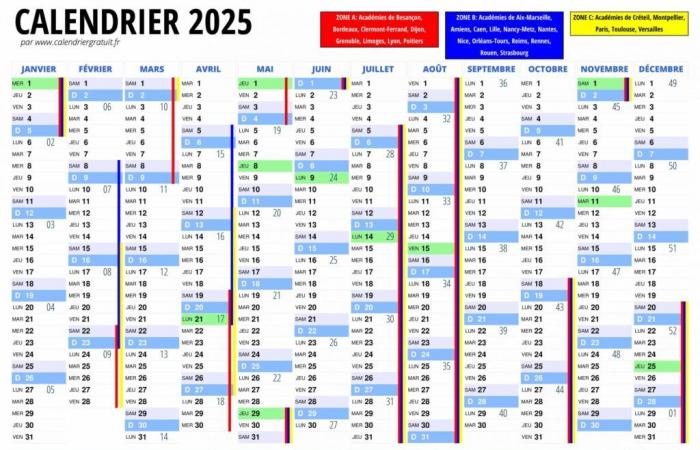January 1, 2025 marks the entry into force of several major changes: revaluation of retirement pensions, new obligations for RSA beneficiaries and tax adjustments.
Today therefore marks a turning point for the French below.
Increase in the price of medical consultations
Since December 22, 2024, the price of medical consultations has increased. This increase in prices results from an agreement between Health Insurance and private doctors, published in the Official Journal on June 21, 2024. In return, doctors will have to limit prescriptions for medications, examinations and sick leave. After the end-of-year holidays, a consultation with a general practitioner will increase from 26.50 euros to 30 euros. Consultations with specialists are also affected.
The health record
The health record also changes. This document, dedicated to vaccination monitoring and the evolution of growth curves, will now be able to inform parents about the risks that the use of screens may represent for children (on the other hand, nothing is planned for adults who are stuck to the media like BFM, C8, TF1… surprising, right?)
Vaccination obligations
Vaccination requirements are evolving for infants, now including ACWY and B meningococci.
At the same time, access to psychological care will be expanded with 12 free annual consultations, without a medical prescription, an expected change in a context of increased need for mental support.
Revaluation of retirement pensions
Basic retirement pensions increase in line with inflation, i.e. 2.2%, in accordance with the announcement made on December 10 by the Ministry of the Economy. This revaluation replaces a saving measure initially planned by the government of Michel Barnier, which limited the increase in basic pensions to 0.8% for the majority of retirees. With the rejection of the Social Security budget, the standard rule of revaluation according to the annual evolution of prices excluding tobacco applies.
Don't take your ticket to the Bahamas straight away, this represents an increase of around 21.6 euros… but it's still a bargain!
Restaurant vouchers
You will no longer be able to buy products that are not directly consumable in supermarkets. Goodbye oil, bacon, flour, or even wine. Only sandwiches, tomatoes and ready meals will remain eligible.
The usable daily amount will return to 19 euros, compared to 25 euros authorized since 2022, but discussions to extend the expanded use of meal vouchers are underway.
According to Thierry Marx president of the UMIH These are “570 million euros in shortfall for restaurateurs, 875 million euros earmarked for mass distribution. Meal vouchers benefit 15% of employees, we have not gone to the front with that. I suggested that we create a food title, we would have something creative and which would reach a wider audience. »
Another idea for 2025 far from Marx: Return money to the French. Instead of vouchers, tickets, coupons and bogus checks, let them do what they want with their money and let's stop fattening corporations and lobbies. The reduction in VAT to 5.5% should already have been compensated and we never saw the result.
New procedures for technical and safety controls
The technical inspection of vehicles will be strengthened in 2025, in particular with the introduction of new procedures. The objective of the latter is to detect fraud to better respond to environmental challenges.
The Home Savings Plan
Another change concerns the Housing Savings Plan (PEL). From January 1, 2025, the interest rate on this savings product will fall by 0.5 points, and thus go from 2.25% to 1.75%, as indicated in a notice published in the Journal official, Wednesday December 18.
The RSA
RSA beneficiaries will be automatically registered with France Travail as soon as they request their benefit. New beneficiaries will have to complete an online questionnaire to be directed to a referral organization, complete this process with an interview and sign an employment contract. Beneficiaries already registered will retain their advisors or will be redirected to appropriate support. Beneficiaries will have to devote fifteen hours per week to integration activities to maintain their allowance. Monthly updating will remain mandatory to receive unemployment benefits. In the event of non-compliance, sanctions are provided.
Unemployment compensation
New measures are being implemented regarding unemployment compensation.
Firstly, the age limits from which unemployed seniors benefit from long-term compensation are raised by two years:
The level of 22.5 months of compensation increases from 53 to 55 years old
The 27-month compensation level increases from 55 to 57 years
Secondly, more restrictive bases will be used to calculate compensation for cross-border workers who pay their contributions in neighboring countries.
Amount of the minimum wage
The gross hourly SMIC will be €11.88 gross, The gross monthly SMIC will be €1,801.80 gross for an employee working 35 hours per week, an increase of €34.88 per month, The SMIC gross annual cost will be €21,621.60 gross.
The one-stop shop for business formalities
For all the formalities to be carried out, companies will have to go through the one-stop shop for formalities. Likewise, all companies with fewer than 11 employees that want to pay their contributions quarterly in 2025 should have done so before December 31, 2024.
Economic activity courts for companies in difficulty
Commercial courts will be replaced by economic activities courts. The latter are now authorized to deal with everything related to business difficulties: from amicable procedures to judicial liquidation.
End of annual tax exemption for hybrid vehicles
Hybrid vehicles will have to pay the annual tax on CO2 emissions. The latter is also increased for company vehicles registered for the first time in France from March 2020. The new scale put in place can be found on the public service website. It is planned to evolve gradually until 2027.
The mobility payment rate
From January 1, changes apply to mobility payment rates. This contribution from companies with more than 10 employees makes it possible to finance public transport. All changes made from New Year's Day are available on the public service website.
Energy Saving Certificate (EEC)
As of January 1, 2025, three new sheets governing the EECs for industry will allow better recovery of waste heat, whether for its conversion (into electricity or compressed air) or its storage.
Fight against energy poverty
· Energy Poverty Diagnosis (DPE)
Housing belonging to private landlords whose DPE label is G will no longer be considered decent from an energy point of view, in accordance with the Climate and Resilience law.
Circular economy
· Ban on plastic warming containers in collective catering for municipalities with more than 2,000 inhabitants
As of January 1, 2025, plastic warming containers in collective catering services such as schools, daycare centers and specific medical establishments will be prohibited in municipalities with more than 2,000 inhabitants.
Ban on export of electrical and electronic waste outside the European Union and OECD member countries
From January 1, 2025, the export of electrical and electronic waste outside the European Union and OECD member countries will be prohibited. The aim is to avoid poor waste management in third countries.
Air quality
Strengthening air quality standards
In accordance with the Climate and Resilience law, restrictive measures for private vehicles classified Crit'air 3 will come into force from January 1, 2025 in territories where the regulatory air quality thresholds are exceeded.
Risk prevention and adaptation
· Information about the legal obligation to clear brush in the information system for buyers and tenants
From January 1, 2025, around forest areas classified as at risk of fire, the future owner or tenant will be informed of the obligation to clear their land, as part of the information system for buyers and tenants. Compliance with legal clearing obligations represents a major risk prevention and safety issue.
Simplified vehicle collection for the REP sector of end-of-life vehicles (ELV)
The principle of REP sectors is based on the fact that producers must ensure the financing and/or organization of the collection and treatment of waste from the products they place on the market. From 2025, old vehicles can now be collected free of charge directly from their place of storage regardless of their brand.
Low Emission Zones
Low Emission Zones extend to 30 new towns, imposing restrictions on polluting vehicles. Cin accordance with the Climate and Resilience Law of 2021, the regulation of the low emissions zone (ZFE) will take a new step. Private vehicles classified as Crit'Air 3 will no longer be able, unless exempted, to drive or park within the perimeter. On the other hand, the First Claimant will be able to continue to take a plane to attend the Pau municipal council and our captains of Industries their private jets to go to Davos for brunch.
How do I know if my municipality is ZFE?
On Mappy, you can display the ZFE (Low Emission Zones) map. This map allows you to visualize the areas in which the Crit'Air sticker is compulsory to travel.
January 1, 2025 therefore marks a turning point for the French below. Between social advances (or decline, it's your choice) and necessary (or imposed, it's your choice) adaptations, these changes reflect a desire for modernization (or a big rant, it's your choice).
It remains to be seen how they will be received and implemented in everyone's daily life.







